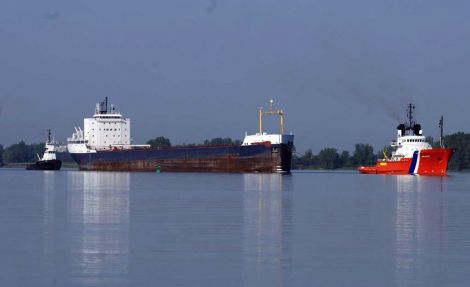News / Government tug plan “a sticking plaster”
NORTHERN isles MP Alistair Carmichael has defended the government’s commitment on maritime safety after it emerged that other European countries deploy far more emergency towing vessels (ETVs) than the UK.
The UK government pays for just one ocean going rescue tug based in Orkney, and is hoping a second will be in place shortly after negotiations with the oil industry are concluded.
In comparison, according to international environment group KIMO, Spain has 14 and Germany has eight state-funded ETVs.
The German vessels cover a much shorter coastline, and include the newly built 78 metre tug Nordic with a bollard pull of 201 tonnes.
KIMO described the government’s approach to was “short-sighted” and that contracting an oil industry tug was like applying a “sticking plaster”.
In October 2010 the Conservative/Liberal Democrat coalition government in Westminster announced plans to save £32.5 million by withdrawing all four UK ETVs, that were introduced following the Braer oil spill off Shetland in 1993.
The announcement combined with plans to close coastguard stations the length and breadth of the country triggered massive protests from coastal communities, including Shetland.
Carmichael, the government’s deputy chief whip and member of the cabinet, lent his weight to the campaign that saved Lerwick coastguard station.
He also takes credit for persuading the government to preserve ETV cover in the north of Scotland using the tug Herakles until 2015, while the busy English Channel remains unprotected.
“The government’s commitment is there for all to see in the tug which is currently stationed in our waters,” he said.
“But for my ability to make that case in government that tug would not be there now. I made the case and it was accepted.”
As for KIMO’s comparisons, he said Germany’s tugs also protected Dutch waters and carried out commercial work on top of their safety role.
Become a member of Shetland News
“Obviously there will be a much greater level of commercial work than we have as Rotterdam and some of the German ports are amongst the busiest in the world,” he said.
KIMO believe the government should provide proper coastal protection and views plans to use an oil industry tug for emergencies with considerable scepticism.
Spokesman Tom Piper stressed how vulnerable the Scottish coastline was to a major pollution incident.
“So much of the economy of rural Scotland and the islands relies on a clean environment – tourism, aquaculture, fisheries.
“And there is a lot of marine traffic and also the West of Shetland oil and gas developments.
“Bringing in an oil industry tug would be like putting on a sticking plaster. We haven’t seen enough details and the worry is that this tug will be too far away to protect the coastline.”
KIMO would like to see the Herakles operate a more “pro-active” patrol regime rather than lying idle off Kirkwall.
Carmichael said he hoped a “not time limited” deal with the oil industry could be “concluded in the next few weeks”.
There would be no operating costs, but the government would insure the tug when it was under coastguard command and pay compensation for any damages incurred during emergencies.
Meanwhile independent Highlands and Islands MSP John Finnie has called on the UK government to increase the number of emergency tug boats protecting Scotland’s shores.
Become a member of Shetland News
Shetland News is asking its readers to consider paying for membership to get additional perks:
- Removal of third-party ads;
- Bookmark posts to read later;
- Exclusive curated weekly newsletter;
- Hide membership messages;
- Comments open for discussion.
If you appreciate what we do and feel strongly about impartial local journalism, then please become a member of Shetland News by either making a single payment, or setting up a monthly, quarterly or yearly subscription.





























































